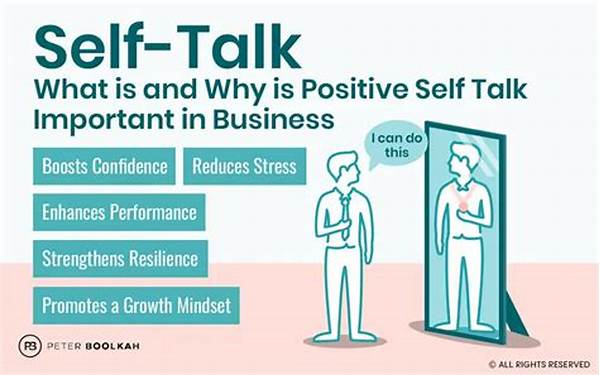- The Mechanism of Mindset Shaping
- Why Self-Talk Shapes Your Mindset and Success
- The Goals: Transforming Mindset through Self-Talk
- Cultivating Success
- Synergizing Self-Talk and Goal Setting
- The Power of Transformative Self-Talk
- Discussion Topics on Why Self-Talk Shapes Your Mindset and Success
- Why Self-Talk Shapes Your Mindset and Success: Structural Insights
In a world where the ceaseless chatter of social media, news outlets, and peer opinions often dominates our thoughts, the voice we most overlook is our own. Yes, that incessant dialog that runs through your mind, sustaining your mood and influencing your actions. This phenomenon—known as self-talk—wields tremendous power over our mindset and, consequently, our success. Imagine it as the narrator of your life, molding your perceptions, dictating your trajectory, and determining your triumphs or tribulations. But why does it have such an extraordinary influence? Armed with insight, let’s walk through the realm of self-talk and uncover why its impact is reminiscent of wielding a double-edged sword; nurturing and constructive or hazardous and limiting.
Read More : Fear Vs. Growth: Tambakbet Reveals How To Pick The Winning Side
Every action begins with a thought, and those thoughts are rooted in identity, capability, and worth. What if you were told that each self-doubting thought plants the seed of stagnation, while every self-assured belief propels you forward? Intriguing, isn’t it? Self-talk isn’t just idle musing; it’s a powerful mechanism for creating cognitive patterns. Those patterns influence how you perceive challenges, respond to setbacks, and embrace opportunities. When you learn to harness this inner dialogue constructively, you pave the way for personal development and success—by crafting a mindset anchored in hope, resilience, and positivity.
From the aforementioned overview, it’s undeniable that our self-talk directly molds our attitudes and decisions. Let’s delve further into why self-talk shapes your mindset and success.
The Mechanism of Mindset Shaping
Positive self-talk fosters a growth mindset, a term dubbed by psychologist Carol Dweck. It is this mindset that opens the door to achievement by promoting learning and persistence. Imagine conquering a daunting task; it’s your inner coach firing you up, saying “You’ve got this”—affirming your potential and spurring you into action. This transformative process alters brain functionality. According to a study published in the Journal of Cognitive Enhancement, positive affirmations activate brain areas associated with self-processing and reward. Engaging in positive self-talk is not merely self-congratulatory—it’s scientifically verified brain training.
Conversely, dwelling in a rut of negativity can escalate anxiety, discourage effort, and cultivate a fixed mindset. When you adopt a narrative of limitation, moments of failure feel like the end rather than an opportunity to learn. Thus, the self-pity party thrives, and the prospect of personal growth is pushed to the back burner.
To change your stars, begin by altering the script. Success stories from luminaries like Oprah Winfrey and Michael Jordan illustrate this principle. They transformed adversity into opportunity through affirmative self-talk, sculpting resilience and an indomitable spirit. In essence, by rewriting the narrative, they changed the paradigm of what was achievable.
Why Self-Talk Shapes Your Mindset and Success
Ultimately, the art of maintaining constructive self-dialogue is akin to planting seeds of potential. If you nurture these seeds, you reap a harvest of triumphs enriched by determination and capability. Consider self-talk as the silent architect of your destiny, guiding your path through an unending dialogue that shapes who you are and who you will become. As this becomes your reality, the words “Why Self-Talk Shapes Your Mindset and Success” will resonate beyond mere semantics—transforming into the foundation of your journey. Now, are you ready to change your narrative?
—
The Goals: Transforming Mindset through Self-Talk
Setting goals is like charting a course towards your success, but filling the sails of your mental ship is where self-talk comes into play. In the world of personal development, goals are the benchmarks, while self-talk fuels the journey. Comprehending why self-talk shapes your mindset and success acts as your map and compass in this voyage. Let’s embark on this illuminating journey and discover how these cognitive tools synergize to shape your potential.
As you ponder life’s direction, understand that each goal you set is intertwined with the quality of your mindset. When you affirm your capabilities, goals become more than mere dreams—they morph into achievable realities. Picture this: You’re in a job interview, a setting that feels intimidating under traditional circumstances. However, by bolstering your self-talk with affirmations, the anxiety dissipates, leaving room for confidence to usher in opportunities. Self-talk harmonizes your goals with personal belief, forging a clarity that leads you from stagnation to success.
Cultivating Success
The mental fortitude gained from positive self-talk is crucial when stormy seas threaten to veer you off course. Research from the University of Pennsylvania links resilience—built on positive self-dialogue—with enhanced problem-solving skills in challenging situations. It serves as a reminder that goals, although daunting, are not only feasible but also conquerable. Envision your goal is to run a marathon; the road to accomplishment involves training and dedication. Throughout, your self-talk fuels the path, reassuring you that fatigue is temporary and perseverance is key. Why self-talk shapes your mindset and success is illustrated here: a steadfast roadmap, propelling diligence over defeat.
Synergizing Self-Talk and Goal Setting
The synchronized dance between motivation and objectives is akin to a well-choreographed performance. Self-talk structures your mindset, while goals provide purposeful direction. Together, they craft a narrative where success isn’t solely measured by completed tasks but celebrated as milestones in personal growth. Conclusive research clarifies that those who leverage positive self-dialogue set more ambitious goals and are more likely to persist. Herein, the power of spoken words takes a tangible form.
Empower yourself with the understanding that a capable mindset, fueled by affirming statements, invites success to follow suit. Your inner dialogue, though seemingly silent, shouts volumes in the cosmos of personal growth. Each word contributes to the story you write—so why not make it a bestseller? Why self-talk shapes your mindset and success is not a hypothesis; it’s a testament to the impact of positivity and ambition creating a life of intention.
The Power of Transformative Self-Talk
To discover the grand tapestry of potential woven by self-talk, begin today. Remember that the tapestry’s threads are spun by your words and continued commitment to personal dialogue. Let that empower and motivate you, for within each mindful word lies the potential to reshape your mindset into one where success is both a goal and a journey.
—
Discussion Topics on Why Self-Talk Shapes Your Mindset and Success
Investigate why self-talk shapes your mindset and success from a neurological perspective. Explore how positive affirmations can rewire the brain for greater achievement.
Discuss different self-talk strategies and techniques that can help individuals enhance their mindset and achieve their goals more effectively.
Counter the bright side by understanding the detrimental effects negative self-talk can have on mental health and success—offering solutions to combat this.
Share real-life stories and testimonials from individuals who have experienced positive shifts by embracing constructive self-talk.
Debate why some self-talk approaches may be overly optimistic, exploring the necessity of aligning them with realistic expectations.
Analyze how self-talk interacts with emotional intelligence, leading to improved interpersonal relationships and success.
Highlight the influence of parental self-talk on children, shaping their developmental mindset and future success.
Examine the connection between mindfulness practices and enhanced self-talk, offering a holistic approach to personal development.
—
Why Self-Talk Shapes Your Mindset and Success: Structural Insights
Why is self-talk such a powerful ingredient in shaping our mindset and ensuring success? Let’s chew over some structural insights that unveil its influence and significance. Our first stop is understanding how self-talk serves as the foundation of personal attitudes, turning mere thoughts into tangible realities.
Imagine the storyline of a character akin to your favorite movie protagonist. What makes them successful? It’s their inner dialogue navigating challenges—informing their decisions, affirming their worth, and redirecting their path as needed. Self-talk in our day-to-day lives works similarly; it acts as a director, orchestrating our narrative with every inner conversation.
The language we use in self-talk—those words and phrases that echo in our minds—holds more power than we often admit. The significance of “you can do this” compared to “this is impossible” is monumental. Words of affirmation embolden you, nurturing your drive to push past adversity. On a deeper level, research underscores that optimism driven by positive self-talk correlates with higher success rates compared to a pessimistic outlook. Through this lens, it’s evident why self-talk shapes your mindset and success.
Bridging your ultimate vision and the present involves crafting a positive self-dialogue that builds resilience, fosters growth, and ignites a passion for continuous learning. In sum, self-talk is your blueprint for action, defining every step from today’s aspirations to tomorrow’s accomplishments. Ready to convert self-talk into your secret weapon for success? It starts with “I can” and radiates outward, transforming potential into reality.



